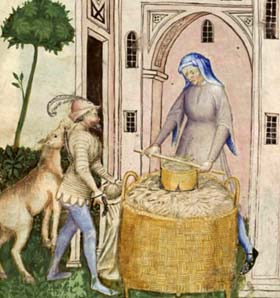The term 'traders' encapsulates a wide spectrum of persons who engaged to some extent in selling raw or manufactured commodities. Between the wealthy merchants or top-ranking craftsmen and the border-line poverty underbelly of urban society lay a mass of artisans (who will be examined elsewhere on this site) and retailers, along with producers of modest amounts of raw materials for sale. Despite providing goods and services that were needed to support large urban populations, those lower on the socio-economic scale came to be increasingly looked down upon by the more prosperous townspeople: at Lynn, for example, they could be described as inferiors, while elitist Londoners might dismiss them as worthless rabble.
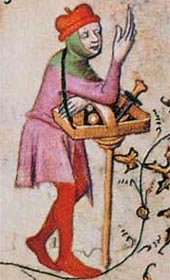
A fifteenth century pedlar with his portable 'stall' in
an illustration for Les Grandes Heures du duc de Berry. There is sometimes
a caricaturish element to depictions of these traders on the margins of society.
Bibliothèque nationale de France, département des Manuscrits
Unlike their mercantile counterparts at the other end of the commercial spectrum, smallest-scale traders were not involved in import/export and so do not appear in customs accounts. They did not engage in high-cost transactions with other traders that might have ended up in litigation, while their tuppenny-ha'penny sales in the street or door-to-door did not generate records of any kind and were less likely to have witnesses, so prosecution by dissatisfied consumers would not have been worthwhile. They were unlikely to be called upon by financial officers to supply goods to the borough. They did not own real estate, the worth of their moveable goods was often less than the minimum at which taxes were assessed, and they had too little to bequeath to warrant a written testament. They were not called upon to take up office in borough government, or even lesser but still responsible roles such as jury duty, which were largely limited to householders or others of creditable reputation; still less were they likely to be selected to undertake royal commissions. They could not afford the entrance fees of citizenship and they did not belong to gilds of any kind from which we have records, while within public assemblies they were inconspicuous. They might receive some attention in local by-laws, but only collectively, as a category of traders. While some may have appeared in rentals, coroners' rolls, or (the most likely) lists of offenders presented at leet courts or other administration of market offences, It is not easy to distinguish them within the larger lists of the accused.
All this is to explain why, consequently, to the historian such traders are, as individuals, largely 'dark' and emerge from the peripheries of respectable society to come to our attention only in unusual circumstances, or when an occupational designation or by-name, such as huckster or pedlar, points them out. The observations made in the preceding paragraph are generalizations, of course, and thorough research of the subject may paint a better picture. We have to be wary of assuming itinerant traders were necessarily the less successful or seedier elements of the commercial sector of society. When Saher le Peddere of Colchester died (ca. 1333) he had sufficient worldly goods to warrant leaving a will; although apparently without wife or children, he owned his residence and held rents and lands in the suburbs. We also know of a pedlar who died at Beaumaris in 1338 leaving stock valued at £2.2s. (it included spices, combs, gloves, purses, belts, needles and thread, and fabric). Yet these are likely to be exceptions to the rule, Saher's by-name perhaps reflecting his occupation only in the early part of his career.
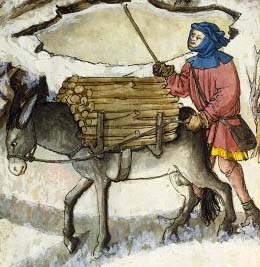
Winter scene of a country-dweller with a purse driving his donkey,
burdened with a load of firewood, to market. Country folk were an important source of food
and fuel supplies for urban populations.
From the Tacuinum Sanitatis
It is not so much that petty traders are absent from the written record, but that our glimpses of them are few, far-between, and, when they come, fleeting. For example, at Colchester's January Lawhundred, 1380, John Wareman (the by-name being suggestive), his wife Joan, and Isabel Ingeland were presented for having, on frequent occasions, intercepted oysters en route to the borough market, bought them up, and then offered them for sale again outside the town bounds; their offence was twofold: first that they had added their own profit margin onto the price at which they purchased the oysters, and second that by preventing the oysters from entering the town, they had deprived it of the toll that would have been charged. In April 1382 we catch sight of all three offenders again, together with Isabel's husband Ingelond Warre[man?], when Robert Shere complained in the borough court that they had been poaching mussels from his patch of the Colne fishery (which the king had confirmed to the burgesses in 1189). Then they disappear from the record.
In the lawhundred proceedings it is among the women presented for breaking the assize of ale and among the forestallers, that we most probably see petty traders. Names that recur as forestallers throughout the court rolls of 1381 to 1383 include John Peddere (derived from pedlar), Constance Hokster (huckster), and John Pulter (poulterer), although we cannot be certain that these surnames accurately reflect the occupations of these particular holders. Similarly the lawhundred records from 1310 to 1313 show a large number of repeat offenders among the forestallers presented – fish, oysters, dairy products, poultry and fruit being the commonly forestalled items – who include several women with the by-name and/or occupation, of huckster, along with a Philip le Pedder.
Fines imposed on the various offenders in January 1311 ranged from 3d. to 12d., possibly assessed based on an estimation of the frequency of offences or the means of the offender; one was clearly a fishmonger and another a common cook, and others were probably also shopkeepers, while John Oldeman was presented alongside a female member of his family and a servant, suggesting that forestalling was an integral part of his business. For such men the seasonal fines were just part of the cost of doing business; Thomas Cook and John Oldeman were fined the maximum (the latter persisting in forestalling for many years to come), while the fishmonger demanded a jury trial, which acquitted him – although his servant had been convicted of forestalling at a previous trial, and on a later date John himself was found guilty of intimidating other market vendors of fish, to get them to stop undercutting his prices. On the other hand, while Annabel le Hukkestere was fined 6d. and Joan le Hukkestere 3d., Alice la Fayre and Margery atte Gate were both pardoned fines, on the grounds they were poor, even though it was not Alice's first offence. Far from being dissuaded by her close escape, Alice seems to have upped her game and was, in October that year, presented in two different categories of forestalling. She perhaps had no palatable option open to support herself, although her by-name may suggest she had already tried one option. At the same period we also hear of Agnes la Hukkester who was too poor to be able to provide pledges to guarantee her prosecution of a complaint of trespass she had introduced; the court accepted her word instead, although the parties later reached an out-of-court settlement.
The lists of offending brewers are mostly women, some single but most married (although sometimes hidden behind their husbands' names) and they likely sold their own brews – it became more usual for these presentments to be said to be for selling, rather than brewing, against the assize; but the lists show no sign of including any hucksters or itinerant vendors, for brewing required equipment, supplies, and space that poorer townspeople lacked. A separate entry in the 1382/83 court roll, however, has one of them, John Plomer's wife, accused of selling ale both outside and inside her house at the price of 4d. a gallon, in deceit of the people, but this gives us only a little more information than the stark lists. We know that at London, at least, hucksters were much involved in retailing ale; in 1375 a con-man, posing as an official of the mayor, made the rounds of hucksters' homes, pretending he had been empowered to seize their ale and report them to the mayor, in order to extort bribes from them to leave them off his list. Also revealing little is a plea of trespass, brought in Colchester's court in April 1380, by Robert Lopham, tinker (an occupation associated at this period with itinerant tradesmen who undertook minor repairs to metalwares, and might sell second-hand metal goods as well), against Peter Tynker, this being the sole reference to the case.
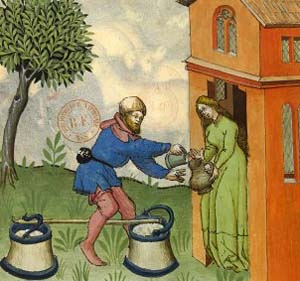
A pedlar selling milk door-to-door fills the jug of
a housewife.
From the Tacuinum Sanitatis
If our documentary evidence of petty traders is sparse, we do have the occasional artistic depiction of such vendors, although rather fewer than we have of merchants. Until the term 'merchant' began to be restricted to traders engaging in wholesale or long-distance trade, petty traders seem to have been perceived as simply a less successful version, or alternatively one on the bottom rung of a ladder to success, who nonetheless met a need within society – for cheap, if low-quality, goods, as a source of foodstuffs outside market days (particularly before the proliferation of shops), and for furnishing country-dwellers with items not available locally – and they were not seen as necessarily more dishonest than other traders. The earliest English tale we have of a merchant is that of the virtuous Godric of Finchale (ca.1065-1170), born in Norfolk of humble parentage, and beginning his career as a pedlar before taking to the sea and engaging in building some wealth through foreign trade; finally he became a hermit at Finchale and acquired a reputation for holiness and wisdom, being unofficially recognized as a saint after his death. And the legend of Havelok the Dane has the future king, at an early stage in his life, assisting his fisherman father to sell his catches at Lincoln. The Luttrell Psalter, on the other hand, acknowledges that pedlars were considered by some undesirables. in showing a tinker with backpack (that includes his bellows), walking with a stick while a dog nips at his ankle. An illustrated version (1427) of Piers Plowman personifies Covetousness in an image of a seedy trader, unshaven and of unsavory appearance, in run-down clothing and grasping the purse at his belt; his wife is Rose the Regrator, who produced poor-quality ale, sold it using false measures and at an excessive profit margin.
The perception of pedlars as vagabonds and rogues grew over the course of the Later Middle Ages, as attitudes hardened towards the poorer members of society in general, and this became even more pronounced in the Early Modern period. Another reflection of that hardening is the effort made to restrict hucksters and country folk with small quantities of provisions to sell from specific stations in marketplaces; the bigger concern, however, was that they tended to avoid official markets altogether, making their activities harder to regulate and police, and were competing with tax-paying shopkeepers of the community. In 1455 Colchester's authorities enacted an ordinance prohibiting chapmen, whether residents or outsiders, from selling their wares in the streets, and required them to operate only in the marketplace; how effective this measure was we do not know.
Small-scale retailers probably preferred to operate in back streets away from areas better supervised by the authorities. At Rye the name Hucksteps Row (a corruption of hucksters) survives for an alleyway, still flanked by late medieval or Tudor cottages, at the southern edge of the small town; in a later century at least it was a neighbourhood overcrowded with poorer families and unmarried women. On the other hand, in London hucksters selling fruit that had passed its 'best by' date did not disdain to place themselves along Cheapside and were presented en masse for it by the ward jurors in 1422.
Portrayals of hawkers and hucksters such as that by Langland are intentionally stereotypical, embodying the evils attributed to traders without the positive side of their having surplus money to apply to charitable or public works. Not all representatations are judgemental, however, for not all works in which they appear were for the purpose of Christian moralizing or social criticism. The Book of Chess, for example, assumes traders can live honest lives if they follow a few guidelines, and illustrations produced for it take a neutral tone, Caxton's Dialogues recognizes that the world of commerce and industry is populated by practitioners of both high and of low ethical standards, and the Tacuinum Sanitatis is not interested in the moral questions underlying commerce, only the health value of various commodities.
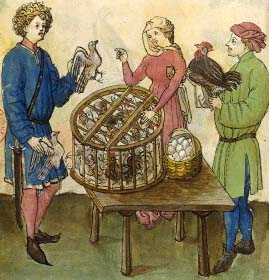
(above) A huckster selling poultry (chickens and doves) and eggs
from a stall.
(below) . A huckster or farmer's wife selling a measured amount of oats (she is levelling
off the measure) to a client who holds his sack, or horse's nose-bag, open.
From the Tacuinum Sanitatis
